The Last Virtual PSA World Conference, Visually Recalled
October 27, 2021
Kurt Vonnegut said, “Online communities build nothing.” But the speechwriting community has maintained itself over these last two years. And next year, we'll get back together again.
A friend of mine asked how last week’s World Conference of the Professional Speechwriters’ Association went. I immodestly said it was a big hit. He asked, “Even virtually? How?”
Good question, and I was a bit hard-pressed for an answer—because I hate virtual conferences too.
Also, because it’s hard to be the conference host and its chronicler, too. (Many thanks to our social media director Allison Ehrich Bernstein for her helpful realtime account of the events.)
And finally? Because most of last week’s World Conference of the Professional Speechwriters Association is a frenzied and disjointed blur, of surreal motorcycle rides from my house in Chicago’s Ukrainian Village to the Malone Media studio, on Chicago’s Goose Island—
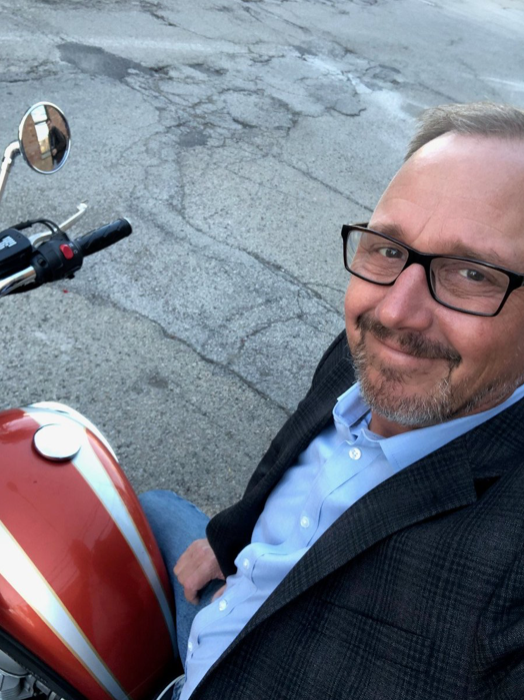
—and home again, to the usual daily routine, with the occasional text received in the anchor chair: “Did u feed dog?”
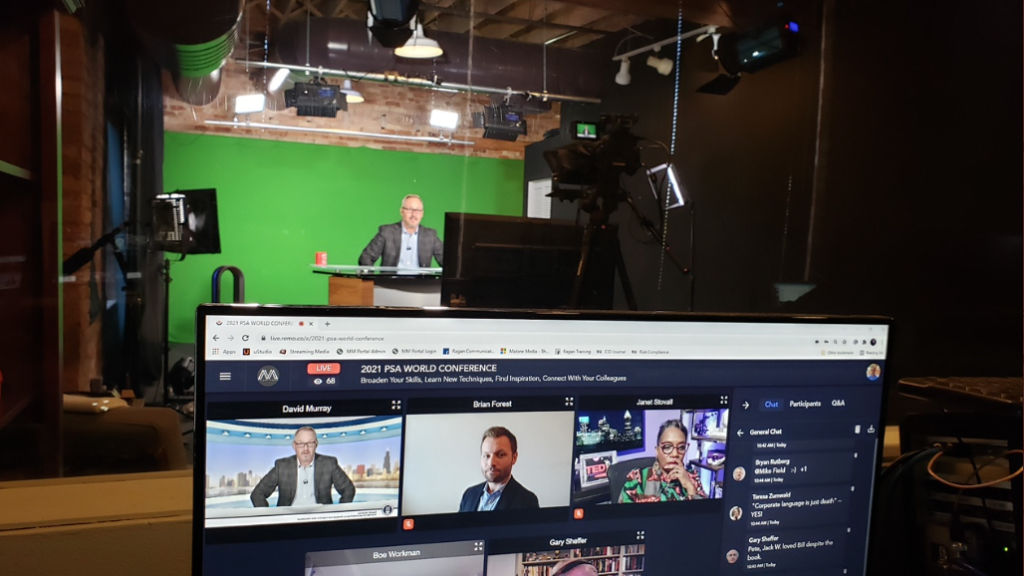
I do remember a few things clearly:
The determined constructiveness of a keynote panel composed of former Mitch McConnell speechwriter Brian Forest (he now runs his own firm, Arboreal Communications), longtime UPS speechwriter and “diversity pragmatist” Janet Stovall, longtime AARP CEO comms chief Boe Workman and former G.E. CCO Gary Sheffer.
In recent years when we’ve put together such a politically diverse panel, bad things happen, like this shit show captured on C-SPAN a couple of years ago. Behold the body language of the speechwriters from (left to right) Nixon, Carter, Reagan, Bush, Clinton and Obama White Houses.
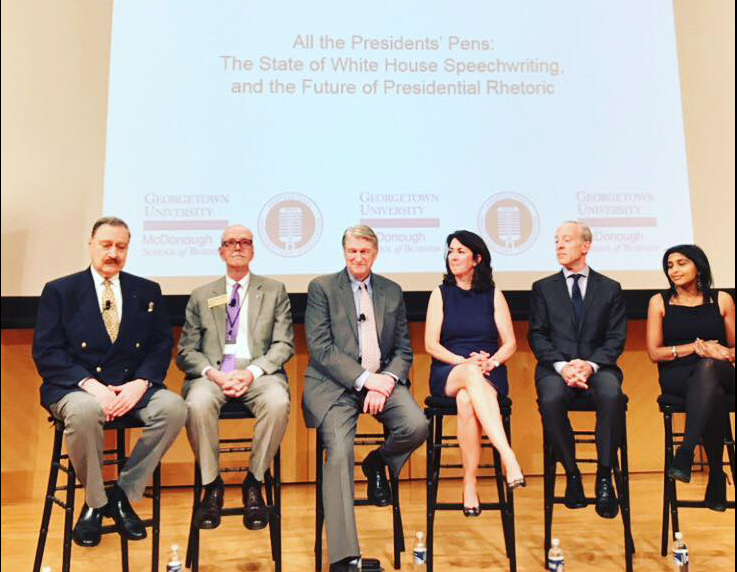
That was in 2017. This—after four years of Trump—is now. We can argue with one another in barrooms. Conferences are for working together, and that’s what these panelists did—acknowledging the difficulty of our moment, and discussing a sustainable road ahead for leaders and communicators who want to do more than appear “woke” on every societal controversy that arises. The consensus: Corporate leaders must be more than purely business-focused bean-counters. But they need to find a way to lead through substance, weighing in on issues to which they and their organizations can bring “depth,” as Stovall put it. “Know it, say it, do it,” Sheffer chimed in.
“You know truths are being told when your agree-to-disagree panel turns into an agree-to-agree discussion from diverse viewpoints,” Stovall wrote afterward. Yep.
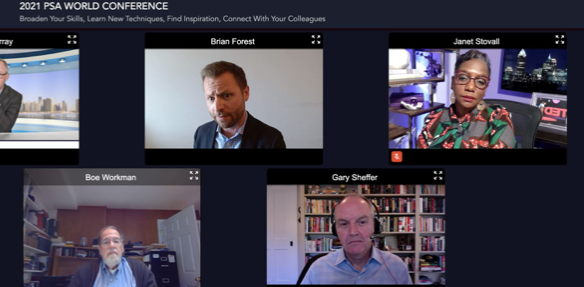
Also: I revealed top-line results of the really dramatic findings of our Speechwriters’ Census 2021.

Look for a full survey report next month, but suffice it to say that speechwriters had a lot to say and they said it strongly: Here’s one written comment that I shared at the conference:
“This is my main complaint and source of professional pain. All of our interactions have to have a goddamn purpose now. There’s no popping into someone’s office to say hi, shoot the breeze, tell a joke or a story, stumble on an interesting fact, or even bounce ideas off each other—much less grab a bite or a beer at the end of the day. That was half the fun! Maybe more! Yes, we still have our work, and we work with each other to get it done as well as we possibly can. But we’ve lost our *work lives*! That in turn makes the ‘ditch digging’ drudgery part of the job loom much larger, while also making it harder to offset with interactions that aren’t task-related. And I hate the hell out of it.“
More—much more—soon.
There was little talk at this conference of speechwriting itself. PSA members are mostly veteran speechwriters who know their craft, but are interested in finding new skills, bringing new perspectives—coaching their principals in “executive presence,” becoming more trusted advisors and better collaborators, figuring out how to help their leaders express themselves more authentically and in places beyond the lectern. That’s what speechwriters are talking about these days.
We took advantage of this being a virtual conference to invite some speakers who might not have been able to make the trip to Washington. The infamous Phil Davison charmed the audience with his good-sported recollection of what went so terribly, virally wrong in his campaign speech for Stark County, Ohio, treasurer back in 2010.
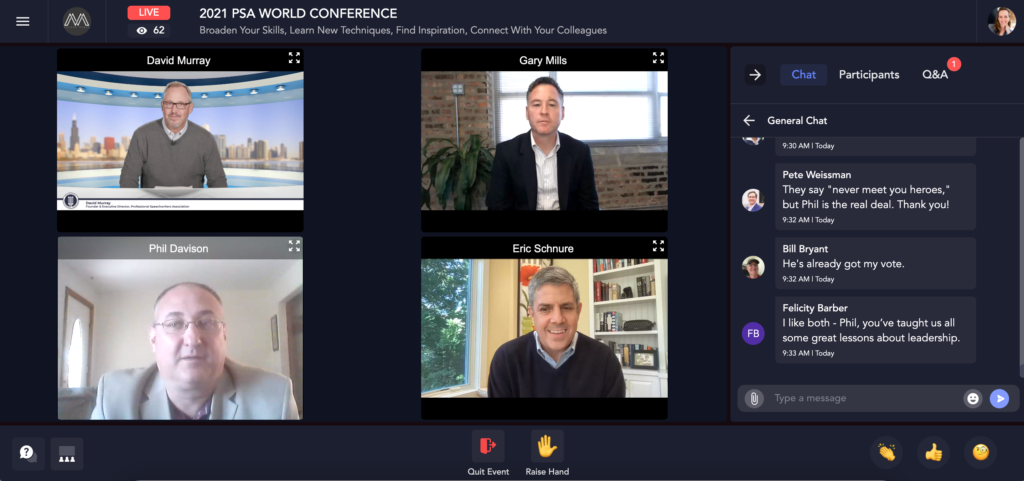
And with Eric Schnure and his speaking coach, Pinnacle Performance co-founder Gary Mills, Davison talked about how the speech affected his life in the aftermath. When Brett Kavanaugh was tearfully testifying during his Supreme Court hearing, a college friend called Davison and said it looked like Kavanaugh was “pulling a Phil Davison.”
The speechwriters appreciated Davison’s good nature, and his hope that his disaster and rhetorical rehabilitation will help other speakers avoid similar misjudgments. “Phil, you are wonderful!” one speechwriter posted in the chat.
Perhaps my personal favorite session was my interview with Zach Wahls, who as a college student gave a speech on gay marriage in Iowa that went around the world, as the most-watched political video of 2011—partly with my help, as I showed it to speechwriters on several continents as a perfect example of pathos, logos and ethos meeting the perfect moment.
Ten years later, I talked with the now-30-year-old Wahls, about the making of that speech—the impact it had on the issue, and also how it helped propel him to his current post, as an Iowa State Senator. He was really insightful, and we’re planning on making that conversation public, so I wan’t say more about it here.
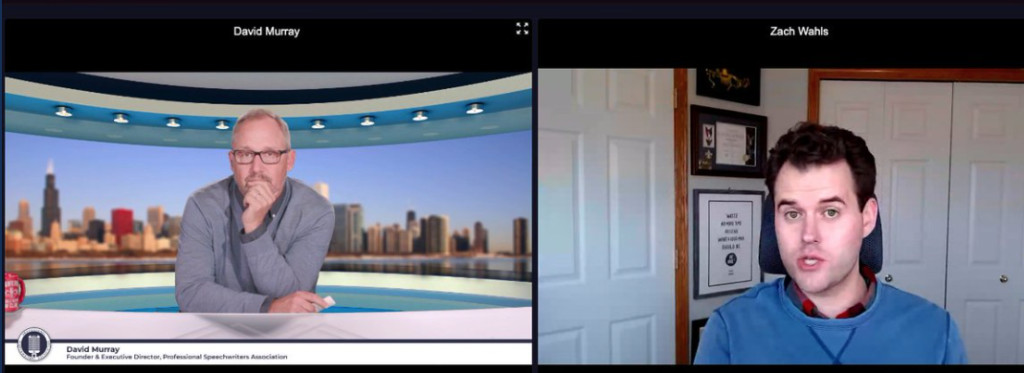
And at the end of the conference, I was slinging rye whiskey from a virtual version of the traditional PSA World Conference watering hole, the Georgetown campus bar, the Bulldog Tavern. On our virtual pub crawl, I had a few glasses myself—in relief that our community has held together over the last couple of years—and in butterflies-anticipation of the joy of an in-person reunion next year.

As I said in my conference closing toast:
Kurt Vonnegut said, “Online communities build nothing.”
And I agree.
But this online community maintained something over these last two years, and next year we hope and expect we will see you in person, again. Thanks for supporting your professional association—and your colleagues—in the meantime.
As I said last year, “We need each other. And we need to stick together. No matter what.”
Thanks everybody. Here’s to you.



